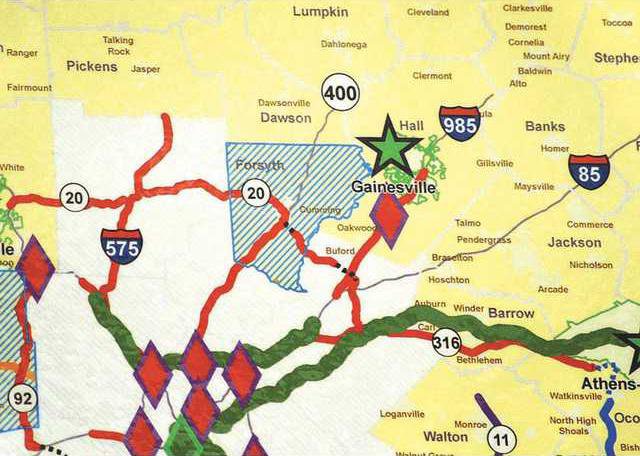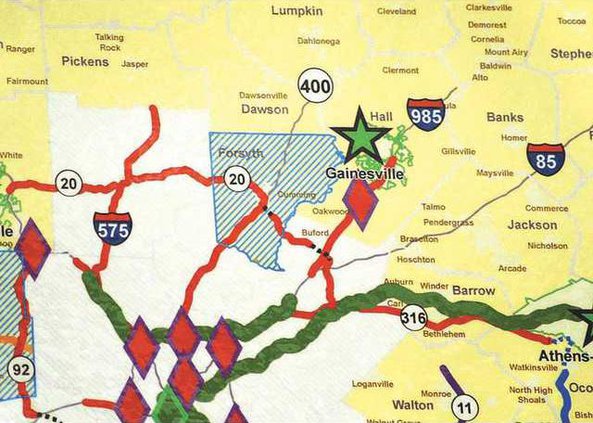The way the state House Transportation Committee sees it, there could be more flow to the ebb of Georgia’s traffic congestion within a decade.
After coming up a few Senate votes shy on a transportation bill last session, the committee unveiled its new and improved plan Monday.
The old legislation would have allowed voters to approve a 1-cent sales tax for road projects within their own regions.
The new proposal, which would last 10 years, expands that ability statewide.
The Georgia 20/20 Statewide Transportation Act, similar to a special purpose local option sales tax, includes a list of projects statewide, ranging from a light rail system to regional and arterial roads and major interchanges, including Ga. 400.
Ga. 400 would see changes, not just in Forsyth County, but around the Interstates 285 and 85 ramps. Hwy. 20 would be widened from two to four lanes, or from four to six lanes from Interstate 75 to Ga. 316.
In addition to the list of projects, the state’s 30 largest cities, including Gainesville, Athens and Rome, would receive $1,000 per resident to go toward improvements like intersections and guard rails.
Forsyth is one of just three counties (Coweta and Paulding) which could also receive the benefit, said District 23 state Rep. Mark Hamilton, who worked to create the bill and project map.
With Forsyth’s population, Hamilton said the $1,000 per person could add up to about $158 million.
“When the people of Forsyth County look at this, they truly benefit from local control, because the county would have the opportunity to spend that $158 million on the right types of projects,” said Hamilton, a Republican from Cumming.
“But they also participate in state roads Ga. 400 and SR 20. Plus, many people in Forsyth County benefit from the many roads and interchanges outside the county.”
The House measure is different from a state Senate plan that would permit regions, including one that would encompass 10 metro-Atlanta area counties, to band together to charge a 1-cent sales tax to fund transportation projects. The tax hike would require approval of the residents in the affected areas.
If the Senate plan receives an OK from state legislators, it would still need the approval of voters statewide in 2010.
Transportation Committee Chairman Vance Smith Jr., who authored the House bill, dubbed it a “clear vision for Georgia.”
“We got real good input from people all across the state, even across the nation,” said Smith, a Pine Mountain Republican. “We’ve worked some kind of long hours, but it’s been rewarding to talk to the people, see what they think.”
If voters approve the proposed referendum in November 2010, Smith said, the penny sales tax could yield at least $25 billion over the following decade.
In addition to the listed projects and high-population cities and counties, the plan also would offer $3.9 billion in grants, or Local Transportation Flexibility Funds, distributed through a population formula to the 149 counties not served by the Atlanta Regional Commission.
Smith said the plan may not be perfect, “But at the rate we’re growing and the rate we still attract industry [to Georgia], this is the medium range plan that we have in place.”
An oversight committee would ensure the money goes toward the specific projects outlined in the referendum.
The panel would have 11 members. The lieutenant governor and house speaker would each appoint four people, with the governor choosing the other three.
Each official would have to appoint at least one member from the opposing political party.
The committee would be responsible for choosing the project order, but with permits and other possible delays, Smith said the projects could essentially rank themselves.
State Department of Transportation projects would not be included. In fact, the DOT is not a part of the legislation.
Instead, the projects would be handled by the Georgia State Road Toll Authority.
Following the meeting, Hamilton said the DOT “has a lot on its plate right now.”
“They’ve been cleaning up, they’ve been digging themselves out of a hole for a while now, and under Commissioner [Gena] Evans’ leadership, I think that they’re making a lot of progress in doing that,” he said.
Hamilton said a statewide approach could benefit more of Georgia’s drivers.
“I can look anybody in the eye and say that we really have taken just about every objection or concern and we’ve really tried to address it,” he said.
District 27 state Sen. Jack Murphy said the senate’s transportation bill has more of a regional focus, specifically the 10-county metro area under the Atlanta Regional Commission.
“I think both bills have a certain amount of merit to them,” said Murphy, a Cumming Republican.
Murphy said the state legislature must “do something this year with transportation,” adding that in the end there likely will be a “combined bill of sorts.”
Hamilton said legislators “have one opportunity to do this, this year.”
“I personally believe this program, this plan, is what’s best for Georgia,” he said of the House plan.
Jeff Gill of the FCN regional staff contributed to this report.
E-mail Jennifer Sami at jennifersami@forsythnews.com.
After coming up a few Senate votes shy on a transportation bill last session, the committee unveiled its new and improved plan Monday.
The old legislation would have allowed voters to approve a 1-cent sales tax for road projects within their own regions.
The new proposal, which would last 10 years, expands that ability statewide.
The Georgia 20/20 Statewide Transportation Act, similar to a special purpose local option sales tax, includes a list of projects statewide, ranging from a light rail system to regional and arterial roads and major interchanges, including Ga. 400.
Ga. 400 would see changes, not just in Forsyth County, but around the Interstates 285 and 85 ramps. Hwy. 20 would be widened from two to four lanes, or from four to six lanes from Interstate 75 to Ga. 316.
In addition to the list of projects, the state’s 30 largest cities, including Gainesville, Athens and Rome, would receive $1,000 per resident to go toward improvements like intersections and guard rails.
Forsyth is one of just three counties (Coweta and Paulding) which could also receive the benefit, said District 23 state Rep. Mark Hamilton, who worked to create the bill and project map.
With Forsyth’s population, Hamilton said the $1,000 per person could add up to about $158 million.
“When the people of Forsyth County look at this, they truly benefit from local control, because the county would have the opportunity to spend that $158 million on the right types of projects,” said Hamilton, a Republican from Cumming.
“But they also participate in state roads Ga. 400 and SR 20. Plus, many people in Forsyth County benefit from the many roads and interchanges outside the county.”
The House measure is different from a state Senate plan that would permit regions, including one that would encompass 10 metro-Atlanta area counties, to band together to charge a 1-cent sales tax to fund transportation projects. The tax hike would require approval of the residents in the affected areas.
If the Senate plan receives an OK from state legislators, it would still need the approval of voters statewide in 2010.
Transportation Committee Chairman Vance Smith Jr., who authored the House bill, dubbed it a “clear vision for Georgia.”
“We got real good input from people all across the state, even across the nation,” said Smith, a Pine Mountain Republican. “We’ve worked some kind of long hours, but it’s been rewarding to talk to the people, see what they think.”
If voters approve the proposed referendum in November 2010, Smith said, the penny sales tax could yield at least $25 billion over the following decade.
In addition to the listed projects and high-population cities and counties, the plan also would offer $3.9 billion in grants, or Local Transportation Flexibility Funds, distributed through a population formula to the 149 counties not served by the Atlanta Regional Commission.
Smith said the plan may not be perfect, “But at the rate we’re growing and the rate we still attract industry [to Georgia], this is the medium range plan that we have in place.”
An oversight committee would ensure the money goes toward the specific projects outlined in the referendum.
The panel would have 11 members. The lieutenant governor and house speaker would each appoint four people, with the governor choosing the other three.
Each official would have to appoint at least one member from the opposing political party.
The committee would be responsible for choosing the project order, but with permits and other possible delays, Smith said the projects could essentially rank themselves.
State Department of Transportation projects would not be included. In fact, the DOT is not a part of the legislation.
Instead, the projects would be handled by the Georgia State Road Toll Authority.
Following the meeting, Hamilton said the DOT “has a lot on its plate right now.”
“They’ve been cleaning up, they’ve been digging themselves out of a hole for a while now, and under Commissioner [Gena] Evans’ leadership, I think that they’re making a lot of progress in doing that,” he said.
Hamilton said a statewide approach could benefit more of Georgia’s drivers.
“I can look anybody in the eye and say that we really have taken just about every objection or concern and we’ve really tried to address it,” he said.
District 27 state Sen. Jack Murphy said the senate’s transportation bill has more of a regional focus, specifically the 10-county metro area under the Atlanta Regional Commission.
“I think both bills have a certain amount of merit to them,” said Murphy, a Cumming Republican.
Murphy said the state legislature must “do something this year with transportation,” adding that in the end there likely will be a “combined bill of sorts.”
Hamilton said legislators “have one opportunity to do this, this year.”
“I personally believe this program, this plan, is what’s best for Georgia,” he said of the House plan.
Jeff Gill of the FCN regional staff contributed to this report.
E-mail Jennifer Sami at jennifersami@forsythnews.com.


